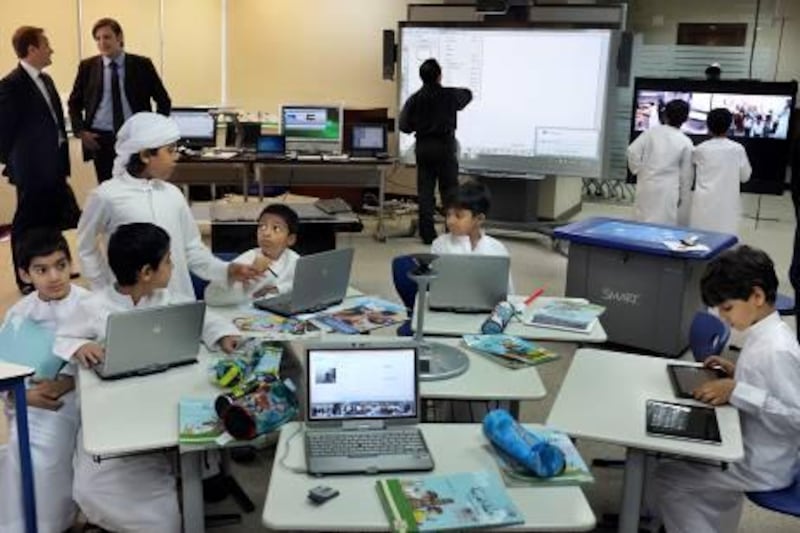DUBAI // Experts have called for mandatory cyber ethics classes after education chiefs in Sharjah issued a notice reminding schools that electronics are not permitted on school property.
The circulars from Sharjah Education Zone urged teachers to confiscate any mobile devices carried by pupils.
"These regulations have always been in place," said Saeed Misbah Al Kaabi, the director of the zone. "We just wanted to reinforce them and remind schools to take action."
He said the reason for the notice was to curb the misuse of phones in school. Many children are caught texting during lessons, while others take unauthorised photographs with their devices and post them online.
Jacqueline Stephen, the educational technology coordinator at Dubai Mens College, said banning mobile devices was a short-sighted fix to the problem.
"Although mobile devices can be a distraction in the classroom, banning them altogether will not teach students how to manage themselves and their use of technology," she said. "Educating them on proper usage will have a long-term positive effect."
She said institutions should have courses that focus on the ethics and legalities surrounding technology and its use. "This could cover topics such as information security, referencing, privacy and plagiarism-detection software."
Many UAE schools follow strict regulations on the use of mobile phones and other electronic devices on school grounds, but experts say this tactic is counterproductive in the long-run.
"Campuses that disallow technological devices will spend most of their time chasing down people with cellphones, iPads or iPods," said Mary Ames, the educational programmes manager at Bon Education that provides professional training to government school teachers. "This is time that could be spent educating pupils on the appropriate educational uses of these devices."
Teachers should establish an atmosphere of respect in the classroom, Ms Ames added. "They should establish rules for when the laptop can be opened," she said. "The use of technology in the classroom is a right that students have, but if they abuse that right, it is in the teacher's power to restrict that right."
Ms Ames said lessons in online ethics and safety are a must because so much information is freely available and easily accessible. "Internet bullying is as real as physical bullying and often times even more emotionally damaging," she said. "Privacy is also a concern for younger children. Just as schools teach safety in the real world they also need to teach internet safety."
Dr Mugheer Khamis Al Khaili, the director general of the Abu Dhabi Education Council (ADEC), said: "Pupils are constantly hooked on to more than one device all the time and we have to channel that power to make classes interesting."
In October, ADEC launched its iClass pilot project, where Grade 3 and 4 pupils will have daily lessons on iPads and use video conferencing between the six pilot schools.
Al Ameen Primary School is taking part in the project and Afra Rashed, the school's information and communications technology teacher, said the children are learning better and are more focused in class.
"Even the parents found it interesting how it helps keep kids attentive and makes learning fun," she said. "It also had a great effect on their social skills and behaviour. They collaborate more with their peers now."
She said there are guidelines the pupils must follow while using technology in the classroom.
"They are not allowed to bring their own phones and the ones we give them are pre-loaded with educational programmes," she said.
Alison Wynn's seven-year-old daughter gets to play on an iPad with her dad when she's at home. But Mrs Wynn said she wishes schools would educate parents on how to maximise the benefits of technology.
"We need to make sure we give her access to helpful content," she said.
"I rely on the school to guide them in the appropriate and safe use of technology."
[ aahmed@thenational.ae ]






